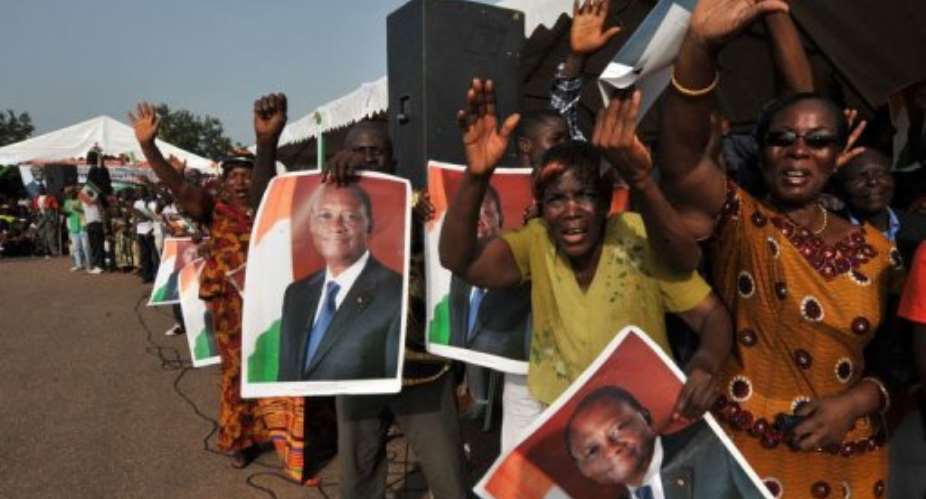DUEKOUE, Ivory Coast (AFP) - President Alassane Ouattara vowed Monday that all those behind killings during Ivory Coast's post-poll crisis would be brought to justice and urged "true reconciliation."
Addressing thousands on his first visit to western Duekoue, a town that suffered the worst killings and has come to symbolise the conflict, he said: "I want to stress to you my desire to put an end to impunity. All the murderers will be punished."
Saying he was "especially moved" to be in Douekoue, Ouattara said he had come to "convey the compassion of the entire nation" and called for a minute of silence in memory of the hundreds of dead.
Ouattara said such atrocities -- blamed on both sides of the 2010-11 crisis -- "should never happen again," adding: "That requires reconciliation, true reconciliation, without vengefulness."
The president also called on those who fled their homes either within the country or across its borders to return "without fear."
The visit comes at the end of a three-day trip to the west, Ouattara's first time in the region since taking office in April 2011 after a political meltdown that saw five months of fighting between his supporters and loyalists of ex-president Laurent Gbagbo.
Ouattara had planned to visit the west in October last year, but had to delay the trip.
"It's a sign of restored peace, because we suffered a lot from the crisis here in Duekoue. We are saying 'never again,' we want peace," local businessman Katogoma Kalo told AFP.
A team from the International Criminal Court visited Duekoue on March 14 to investigate suspected mass graves that appeared to hold hundreds of people killed in late March 2011, when forces loyal to Ouattara seized the town.
According to the United Nations, some 3,000 people died in the post-poll violence -- 1,000 of them in the west, a region bordering Liberia that is prone to ethnic tensions.
The region still faces security problems, and some 170,000 people remain displaced, the United Nations says.





 Meta releases new version of conversational AI across its platforms
Meta releases new version of conversational AI across its platforms
 Cape Town named Africa’s Best Airport 2024 by Skytrax
Cape Town named Africa’s Best Airport 2024 by Skytrax
 Bono East: Four injured after hearse transporting corpse crashes into a truck
Bono East: Four injured after hearse transporting corpse crashes into a truck
 ‘Be courageous, find your voice to defend our democracy’ — Sam Jonah urges journ...
‘Be courageous, find your voice to defend our democracy’ — Sam Jonah urges journ...
 Exodus of doctors, nurses and teachers have worsened because of unserious Akufo-...
Exodus of doctors, nurses and teachers have worsened because of unserious Akufo-...
 2024 election: Avoid insults, cutting down people in search of power – National ...
2024 election: Avoid insults, cutting down people in search of power – National ...
 ‘You passed through the back door but congratulations’ — Atubiga on Prof Jane Na...
‘You passed through the back door but congratulations’ — Atubiga on Prof Jane Na...
 Government’s $21.1 billion added to the stock of public debt has been spent judi...
Government’s $21.1 billion added to the stock of public debt has been spent judi...
 Akufo-Addo will soon relocate Mahama’s Ridge Hospital to Kumasi for recommission...
Akufo-Addo will soon relocate Mahama’s Ridge Hospital to Kumasi for recommission...
 We must not compromise on our defence of national interest; this is the time to ...
We must not compromise on our defence of national interest; this is the time to ...
